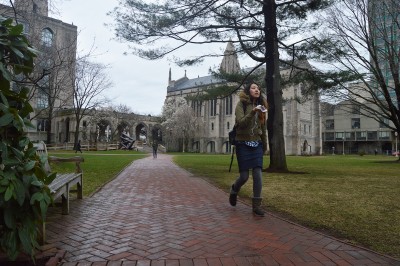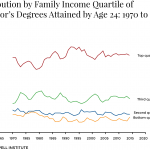
A majority of Boston University students who responded to a survey about the proposed General Education Program are against it, according to the results released Monday.
Three hundred and eighty students responded to the survey run by the Student Curriculum Committee, conducted from March 17 to April 1.
Approximately 55 percent of the respondents reported that the program, recently proposed to members of the University Council, was not a good idea. Around 14 percent reported that they were in favor of the program.
SCC member Aelish Benjamin-Brown said the committee conducted the survey to measure student input, which plays a large part in the program.
“We attended a general meeting with the task force on Feb. 4, and we noticed there wasn’t a lot of student turnout,” said Benjamin-Brown, a sophomore in the College of Arts and Sciences. “We were interested in getting a more holistic idea of what the student body thought [of the proposal].”
The committee developed a survey that was posted on social media and open to all BU students, Benjamin-Brown said.
“We actually got a great response,” she said. “We were looking at the results and thought it was worthy of a report. If the task force saw what we saw through our poll, it would help them get a better idea of what the student body in general thought [of the proposal].”
In the report, the SCC requests a series of meetings with university administrators, including Provost Jean Morrison, task force co-chair Elizabeth Loizeaux and co-chair Bruce Schulman.
Benjamin-Brown said the committee conducted the survey and wrote the report before meeting with the administration because, through the report, the SCC will have a better chance at reaching out to the university.
“We felt like we had something we want[ed] to talk about, we felt passionately about it, we felt like we were capable of reaching out to the administration,” she said. “This report we made clearly demonstrates our thoughts.”
Benjamin-Brown said the committee has had a successful relationship with the administration, and she hopes it will have a meaningful impact on the future of the proposal.
“The administration is busy,” she said. “They don’t have a lot of time on their hands, so something straightforward, clear and concise … was our way of getting in touch with administration.”
Loizeaux was unavailable for immediate comment.
Several students said their input would be critical to a potentially beneficial General Education Program.
Jia Li, a sophomore in the Questrom School of Business, said by bringing students in different colleges together, the General Education Program could potentially increase a feeling of community among students.
“The idea of general education is nice because this campus is so big, and [the General Education Program] could provide a sense of togetherness,” Li said. “Being in the same school develops similar thinking among students, so this could be a chance for students to gain perspective.”
Stephanie Singh, a junior in the Sargent College of Health and Rehabilitation Sciences, said students from different colleges could benefit from sharing their experiences through general education.
“Coming into contact with students from different colleges would broaden perspectives,” Singh said. “Students’ feedback is [also] important because [the university] needs student approval of the program.”
Sara Caniglia, a sophomore in the College of General Studies, said a program with a similar structure to CGS’s Capstone project would be beneficial for undergraduate students.
“Even though we are a liberal arts school, students tend to be driven specifically,” Caniglia said. “Being in CGS changed my perspective because I took classes that made me realize I like something broader than I originally thought.”














